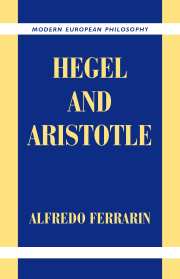Book contents
- Frontmatter
- Contents
- Acknowledgments
- List of Abbreviations
- Introduction
- PART I THE HISTORY OF PHILOSOPHY AND ITS PLACE WITHIN THE SYSTEM
- PART II LOGIC AND METAPHYSICS
- PART III ARISTOTLE AND THE REALPHILOSOPHIE
- PART IV CONCLUSIONS
- 10 Truth, Holism, and Judgment
- 11 The Pictures of Aristotle in Hegel's Formative Years
- Bibliography
- Index
11 - The Pictures of Aristotle in Hegel's Formative Years
Published online by Cambridge University Press: 22 October 2009
- Frontmatter
- Contents
- Acknowledgments
- List of Abbreviations
- Introduction
- PART I THE HISTORY OF PHILOSOPHY AND ITS PLACE WITHIN THE SYSTEM
- PART II LOGIC AND METAPHYSICS
- PART III ARISTOTLE AND THE REALPHILOSOPHIE
- PART IV CONCLUSIONS
- 10 Truth, Holism, and Judgment
- 11 The Pictures of Aristotle in Hegel's Formative Years
- Bibliography
- Index
Summary
When one lives far away, one hears only of the major artists in the galaxy and is often satisfied with merely knowing their names; but when one draws closer, the twinkle of stars of the second and third magnitude becomes visible until, finally, one sees the whole constellation – the world is wider and richer than one had hitherto supposed.
(Goethe, Italienische Reise)Two Historical Questions
The extent to which Aristotle may have influenced the formation of Hegel's philosophical thought is far from clear. It is hard to distinguish between what has contributed to the development of Hegel's thought on specific counts and what Hegel is pleased to find in Aristotle after having independently reached similar conclusions. It is even more conjectural, if not otiose, to speculate on why Hegel sometimes openly admits sharing a common ground with Aristotle, while sometimes he does not mention him at all, despite the apparent Aristotelian origin of some of his theses or the similarity between their perspectives in contradistinction to the modern tradition which Hegel criticizes. Thus sometimes we cannot determine when Hegel writes with a similarity with Aristotle in mind, or with Aristotle as an alternative model against which he could define his position more sharply. Obviously, this does not happen with Aristotle only. It is Hegel's customary practice to discuss theories and concepts of thinkers he does not mention, often because they were familiar to his audience and he deemed an explicit reference unnecessary.
- Type
- Chapter
- Information
- Hegel and Aristotle , pp. 394 - 412Publisher: Cambridge University PressPrint publication year: 2001



